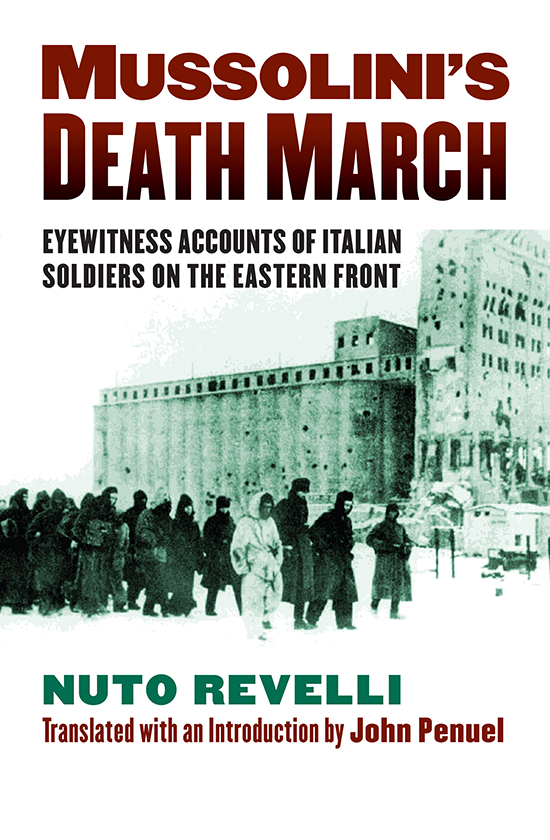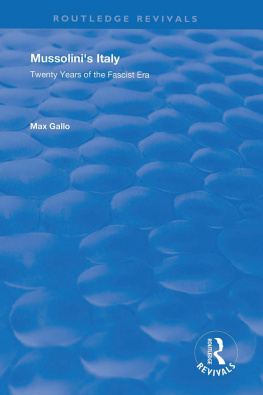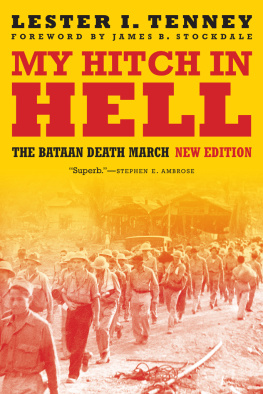Revelli - Mussolinis Death March
Here you can read online Revelli - Mussolinis Death March full text of the book (entire story) in english for free. Download pdf and epub, get meaning, cover and reviews about this ebook. year: 2019, genre: Detective and thriller. Description of the work, (preface) as well as reviews are available. Best literature library LitArk.com created for fans of good reading and offers a wide selection of genres:
Romance novel
Science fiction
Adventure
Detective
Science
History
Home and family
Prose
Art
Politics
Computer
Non-fiction
Religion
Business
Children
Humor
Choose a favorite category and find really read worthwhile books. Enjoy immersion in the world of imagination, feel the emotions of the characters or learn something new for yourself, make an fascinating discovery.

- Book:Mussolinis Death March
- Author:
- Genre:
- Year:2019
- Rating:4 / 5
- Favourites:Add to favourites
- Your mark:
- 80
- 1
- 2
- 3
- 4
- 5
Mussolinis Death March: summary, description and annotation
We offer to read an annotation, description, summary or preface (depends on what the author of the book "Mussolinis Death March" wrote himself). If you haven't found the necessary information about the book — write in the comments, we will try to find it.
Mussolinis Death March — read online for free the complete book (whole text) full work
Below is the text of the book, divided by pages. System saving the place of the last page read, allows you to conveniently read the book "Mussolinis Death March" online for free, without having to search again every time where you left off. Put a bookmark, and you can go to the page where you finished reading at any time.
Font size:
Interval:
Bookmark:

Mussolinis Death March
MODERN WAR STUDIES
Theodore A. Wilson
General Editor
Raymond Callahan
J. Garry Clifford
Jacob W. Kipp
Allan R. Millett
Carol Reardon
Dennis Showalter
David R. Stone
Series Editors
Mussolinis Death March
Eyewitness Accounts of Italian
Soldiers on the Eastern Front
Nuto Revelli
Translated with an Introduction by
John Penuel

University Press of Kansas
2013 by the University Press of Kansas
All rights reserved
Original title: La strada del davai
1966 and 2004 Giulio Einaudi editore s.p.a., Turin, for the Italian original
Published by the University Press of Kansas (Lawrence, Kansas 66045 ), which was organized by the Kansas Board of Regents and is operated and funded by Emporia State University, Fort Hays State University, Kansas State University, Pittsburg State University, the University of Kansas, and Wichita State University
Library of Congress Cataloging-in-Publication Data
Revelli, Nuto.
[Strada del davai. English]
Mussolinis death march : eyewitness accounts of Italian soldiers on the Eastern
Front/Benvenuto Revelli ; translated and with an introduction by John Penuel.
pages cm. (Modern war studies)
Original title: La strada del davai
Includes index.
ISBN 978-0-7006-1908-5 (cloth : alkaline paper)
ISBN 978-0-7006-2884-1 (ebook)
1. World War, 19391945CampaignsEastern Front. 2. World War, 19391945CampaignsSoviet Union. 3. World War, 19391945Personal narratives, Italian. 4. Soviet UnionHistoryGerman occupation, 19411944. 5. Revelli, Nuto. 6. Italy. Regio Esercito. AlpiniBiography. 7. SoldiersItalyBiography. I. Title.
D764.R4613 2013
940.5413450922dc232012045427
British Library Cataloguing-in-Publication Data is available.
Printed in the United States of America
10 9 8 7 6 5 4 3 2 1
The paper used in the print publication is recycled and contains percent post-consumer waste. It is acid free and meets the minimum requirements of the American National Standard for Permanence of Paper for Printed Library Materials z.- 1992 .
For my sister Tere
by John Penuel
Davai.... davai, bistra! Forward.... Forward! Get moving !
We were hearing that phrase for the first time. Shoutedbarked, in factby the guards escorting us, it would obsess us for months. They repeated it at maddening intervals, not only to urge on the men walking in the lead but above all to threaten those who, exhausted or limping on feet turned to marble, were shuffling along at the rear of the column. For years we would hear it: to hasten the fall-in, the roll call, the bath, the distribution of rations, the cleaning of rooms, the felling of a tree, the digging of a ditch, the weeding of a row of crops .
Davai. For us, this word has become a symbol; it encompasses the entire tragedy experienced by tens of thousands of Italians in the land of Russia.
Carlo Vicentini, Noi soli vivi (We alone alive)
The pleasant arcaded streets of the old market town of Cuneo, capital of the province of the same name and located in the northwestern Italian region of Piedmont, are laid out in a grid atop a wedge-shaped plateau at the confluence of the Stura and the Gesso Rivers. The tip of the wedge, facing northeast, overlooks a rich agricultural plain dotted here and there with small towns and their outlying clusters of houses, known as tetti or frazioni. Monte Viso, at , meters above sea level, far higher than the other peaks in the Cottian and Maritime Alps, draws the eye from the plain, from the hill country around the town of Mondov, and from the city of Cuneo itself. For their part, the Stura and the Gesso, as well as their numerous small tributaries, form a complex knot of narrow valleys and drain a mountainous area rougher and much poorer than the cheerful plain. Until the postwar industrial boom, many of the sturdy and industrious mountain dwellers made a meager living farming small plots carved out of the steep hillsides and tending to small flocks of sheep and a milk cow or two. They lived in dry-stone houses known as baite, and their mother tongue, like that of their cousins just across the border in the French Alps, was often an Alpine dialect of Occitan. Piedmontese and Italian were only second and third languages. The men of the area typically served in the mountain troops known as the alpinino other branch of the armed services would do.
Benvenuto (Nuto) Revelli, not himself a mountain dweller, was born in Cuneo on July , 1919 . His family was comparatively well off (his father worked for a bank). As Revelli himself notes, he would come into close contact with the country dwellers of his province only once he had completed officer training. Until then, his youth was spent like that of many of his middle-class, city-dwelling contemporaries, nearly all of whose schooling, if not all of it, had taken place under the sway of fascism. (Benito Mussolini had became prime minister in 1922 ; in 1925 he seized dictatorial powers and subsequentlywhile officially styled as head of government answerable only to the king, Vittorio Emanuele IIIhe was known as Il Duce.) At the age of nine or ten Revelli swore in the name of God and Italy to obey the Duces orders and to serve the cause of the Fascist revolution with all his strength and, if necessary, with his blood. His school became a barracks. His teachers wore the black shirts of the Fascists, and so did he and his classmates. Saturdays he would spend at the local headquarters of the Fascist youth organization,
The young Revellis zeal earned him trips to the so-called campi Dux, large gatherings of Fascist youth from all over Italy, held in a tent city on the edge of Rome. He eventually ran out of room for all the enameled decorations and medals he had collected. Everything that smacked of strength. he writes, military parades, oceanic masses, electrified me.
Revellis father, like many people whose jobs required it, had come to terms with the Fascist Party but was not, to all appearances, an enthusiast. In fact, in a diary entry from the spring of 1943 on his return, sick and disillusioned, from the Russian front, Revelli regrets that his father, who knew, had done nothing to temper his earlier zeal. The father had seen that, for his son, fascism meant athletic competitions, fitting in, being like everybody else, and he had said nothing.
In September 1939 , Revelli, who had in the meantime qualified as a geometra, a surveyor, won admission to the prestigious Military Academy of Modena, the oldest institution of its kind, and began what would be nearly two years of officer training in a climate of rigor and austerity. Rigorous though his studies at the Academy may have been, they were not supplemented by thorough outdoor training. Revellis knowledge of aviation was to remain limited to what he had heard of the transatlantic flights led by the future governor-general of Italian Libya, Italo Balbo. And not once in his training did he see a tank.
On June , 1940 (Revelli had by then completed his first year at Modena), Mussolini, taken by surprise by the imminent collapse of France and not wanting to engage in peace talks without a few thousand Italian dead of his own, stabbed a prostrate France in the back. The declaration of war on France and Britain strengthened Revellis commitment to his studies. But for the inhabitants of the valleys to the west and south of Cuneo, from which many of the men of the Cuneense Division of the alpini were drawn, it was a calamity. Not only did they have to evacuate their villages, but their sons also had to make war on a country they often regarded as a second homeland: Fascist restrictions had not entirely ended the mountain dwellers tradition of winter emigration, over high, unguarded passes, to France. In fact, for nearly all the inhabitants along the length of the front, from the Mont Blanc Massif in the north to the mouth of the Roya on the Mediterranean, the brief campaign was highly disconcerting and calamitous. Mario Rigoni Stern, for example, recalls descending a mountain in the Graian Alps and coming across two fellow alpini, stretcher-bearers from the Aosta Battalion (and thus likely to be natives of the area), struggling through fresh snow with a stretcher. He turned to the seemingly wounded man, wished him a speedy recovery, and was astonished when the two Italian stretcher-bearers replied to him, Il est mort, letting him know in the language of the enemy that his good wishes were no longer of any use.
Font size:
Interval:
Bookmark:
Similar books «Mussolinis Death March»
Look at similar books to Mussolinis Death March. We have selected literature similar in name and meaning in the hope of providing readers with more options to find new, interesting, not yet read works.
Discussion, reviews of the book Mussolinis Death March and just readers' own opinions. Leave your comments, write what you think about the work, its meaning or the main characters. Specify what exactly you liked and what you didn't like, and why you think so.






